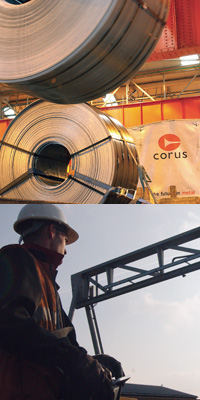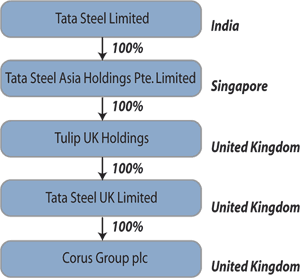Management Discussion and Analysis

The Corus acquisition was
completed on 2nd April, 2007. |
IV. Consolidation of Ferro Chrome business in India and
Overseas
The Company is one of the largest producers of ferro chrome
in India. The Company is setting up a greenfield ferro chrome
project in South Africa which will produce 134,500 tonnes per
annum of ferro chrome. This project is likely to be commissioned
by November 2007. South Africa is the largest producer of
ferro chrome in the world and availability of cheap power
and chrome ore makes the country one of the most attractive
destinations to produce ferro chrome.
On 8th March, 2007, the Company acquired 100% stake in
Rawmet Ferrous Industries Private Ltd. in Orissa to strengthen
its production capacity for manufacture of ferro chrome in
India. Rawmet has a ferro alloys plant which can produce 50,000
tonnes per annum of high carbon ferro chrome.
4. Ownership of strategic raw materials
As part of its long term strategy, the Company is focused on
developing raw material sources for its global operations. In this
regard, the Company has formed a Global Minerals Group which
is actively exploring various opportunities to secure access to
iron ore and coal in various geographies. This will enable the
Company to continue its competitive cost position in the global
steel industry.
5. More from Steel and Branding
The Company remains focused on enriching its product mix and
pursuing branding initiatives to move up the value chain. The
Company has several well known brands in its portfolio i.e. Tata Steelium (India’s first branded cold rolled steel), Tata Shaktee
(galvanised corrugated sheets), Tata Tiscon (re-rolled bars),
Tata Pipes, Tata Bearings, Tata Wiron (galvanised wire products),
Tata Agrico (hand tools and implements) and most recently
Tata Structura (steel hollow sections). Due to consistent efforts
in the last few years, the Company’s turnover from branded
products increased from Rs. 1,300 crores in FY 2002-03 to
Rs. 4,604 crores in FY 2006-07. The Company sold around 1
million tonnes of branded products and crossed the USD 1
billion mark in terms of branded products turnover in the last
financial year. Currently, around 25% of the revenue of the
Company comes from the sale of branded products in India.
In order to enter into new market segments, the Company
entered into a 50:50 Joint Venture agreement with BlueScope
Steel for Coated Steel and Building Solutions business in India
and other SAARC countries. The JV Company has already set
up building solutions facilities in its Pune, Bhiwadi and Chennai
plants. The coated steel plant will be in Jamshepur and currently
site development work is in progress. This project is likely to be
commissioned in 2009.
6. Control Over Logistics
With the proposed expansion of steel capacity in Jamshedpur,
Orissa and other green-field projects in India and overseas as
well as manufacturing footprints in various countries across
the world, the Company’s import / export cargo will increase
significantly. To meet the increased requirement and reduce the
total logistics cost of sea bound cargo, the Company signed a
Joint Venture agreement with Larsen and Toubro Limited to
develop a deep-sea water port in Orissa which will handle cape
size vessels. This project will be commissioned by early 2010 at
an estimated cost of Rs. 2,450 crores.
On 5th December, 2006, Tata Steel and Nippon Yusen Kabushiki
Kaisha (NYK Line) entered into a 50:50 Joint Venture agreement
for setting up a shipping company to cater to dry bulk and
break bulk cargo requirements. The Joint Venture shipping
company - Tata NYK Shipping Pte. Ltd., has been incorporated
in Singapore.
E) Acquisition of Corus and its Financing
a) Corus Acquisition Process
On 20th October 2006, the Boards of Tata Steel, Tata Steel UK
(100% subsidiary of Tata Steel) and Corus reached an agreement
on the terms of a recommended acquisition of the entire issued
and to be issued share capital of Corus, at a price of 455p in
cash for each Corus share. This was to be implemented by
means of a Scheme of Arrangement under Section 425 of the
UK Companies Act, 1985, and the relevant scheme document
was sent to the Corus shareholders on 10th November, 2006.
Subsequently, a competitive situation emerged when a
Brazilian steel company - Companhia Siderurgica Nacional
(CSN) subsequently approached Corus with a proposal to
make a cash offer. While Tata Steel revised its offer to 500p per
share, CSN made a binding offer at 515p per share in December
2006. The Board of Corus recommended CNS’s offer to the
shareholders.
As the process got extended, the Panel on Takeovers and
Mergers in the UK (the Panel) set a deadline of 30th January,
2007 as the final date by which Tata Steel and CSN could
revise their offers for Corus Group plc. The Panel subsequently
announced in January 2007 that in order to provide an orderly
resolution to this competitive situation, an auction process
would be held on 30th January, 2007 to establish final bids
from both Tata Steel and CSN. This auction process began in
the evening of 30th January (Indian time) and ended in the
early hours of 31st January, 2007 (Indian time) when the Panel
announced that Tata Steel has won the auction to acquire Corus
at a price of 608p per share.
The Board of Corus subsequently recommended the Tata Steel
offer to its shareholders who voted to approve Tata Steel’s
Scheme of Arrangement, at an Extra-Ordinary General Meeting
held on 7th March, 2007. Corus’ shares were subsequently
suspended from trading on each of the London, New York and
Amsterdam Stock Exchanges and the Scheme became effective
on 2nd April, 2007.
b) Corus Financing Structure
The financing structure of the Corus transaction as on date is
given below:

The above financing structure is being re-organised to achieve
fiscal unity in Netherlands and consequent tax efficiencies.
c) Corus Financing
On 2nd April, 2007, Tata Steel completed its acquisition of
Corus Group plc (Corus) at a price of 608p per ordinary share
in cash. The net funding requirement for the acquisition of
Corus was Rs. 56,150 crores (USD 12.90 billion). The acquisition
was initially funded by a cash contribution by Tata Steel of Rs. 11,750 crores (USD 2.7 billion) (funded by a mixture of its own
cash resources and syndicate loans) to Tata Steel Asia Holdings
Pte. Ltd. (TSAH). TSAH raised bridge loans of Rs. 10,900 crores
(USD 2.5 billion) and Tulip UK Holdings raised a mezzanine
loan of Rs. 2,600 crores (USD 0.6 billion) which was invested
by way of equity in Tata Steel UK Ltd. To finance the balance of
the consideration due under the acquisition, Tata Steel UK Ltd.
(through its wholly owned subsidiary, Tulip Finance Netherlands
BV) raised senior debts of Rs. 17,400 crores (USD 4.0 billion) and
Mezzanine bridge of Rs. 13,500 cores (USD 3.1 billion). These
loans were raised without recourse to Tata Steel.
At the Board Meeting held on 17th April, 2007, Tata Steel’s
Board approved the long term funding arrangement for the acquisition of Corus as per details given below:
| |
Rs. crores |
USD billion |
| Equity Capital from Tata Steel Ltd. |
17,850 |
4.10 |
| Quasi - Equity / long term
funding |
11,570 |
2.66 |
| Total Equity and Quasi-Equity
contribution (a) |
29,420 |
6.76 |
| Non-recourse long-term debt at
Corus (b) |
26,730 |
6.14 |
| Total (a+b) |
56,150 |
12.90 |
The Company proposes to infuse USD 4.1 billion as equity
to part finance the transaction. The equity will comprise of USD 700 million from internal generation, USD 500 million of
external commercial borrowings, USD 640 million from the preferential issues of equity shares to Tata Sons Ltd. in 2006-
07 and 2007-08, USD 862 million from a rights issue of equity
shares to the shareholders, USD 1000 million from a rights
issue of convertible preference shares and about USD 500
million from a foreign issue of equity-related instrument.
F) Review of Operations – Steel Division
This year witnessed the best ever production of hot-metal
(5.55 million tonnes, an increase of 7.3% as compared to 5.18
million tonnes in the previous year), crude steel (5.05 million
tonnes, an increase of 6.7% as compared to 4.73 million tonnes
in the previous year) and saleable steel (4.93 million tonnes,
an increase of 8.3% as compared to 4.55 million tonnes in the
previous year).
The “G” Blast Furnace in Jamshedpur crossed 2 million tonnes
production of hot metal against its rated capacity of 1.8 million
tonnes.
The New Rebar Mill which was installed under the One million
tonnes expansion project also achieved its rated capacity of
50,000 tonne per month during the year. The total production
of rebars at the Jamshedpur Works almost reached the 1 million
tonne mark during the year.
The Hot Strip Mill produced 3.24 million tonnes as compared
to 3.08 million tonne in the previous year. The Cold Rolling Mill
crossed the milestone of 1.5 million tonnes against its rated
capacity of 1.2 million tonnes.
The all round increase in production came with improvements
in the manufacturing processes specially in the areas of specific
consumption of raw materials, energy, refractories, water and lime.
The Company successfully completed in-house up-gradation of
the “E” blast furnace in Jamshedpur. The “E” blast furnace which
used to produce 1,050 tonnes per day before up-gradation will
now be able to produce 1,350 tonnes per day. The coke and
fuel rate consumption of the “E” blast furnace will also reduce
due to the increase in the size of the furnace.
Raw Materials
The West Bokaro Collieries for the first time dispatched 1.9
million tonnes of clean coal at an average of 13% ash content.
The reduced ash level in captive coal contributed significantly
in substituting the more expensive imported low ash coal. In
order to reduce the alumina content in the iron ore, a modern
beneficiation plant for iron ore fines has been set up by
the Company.
Research & Development
- Commercial production of various grades of high strength
steel for automobiles was established for the first time.
- Super ductile rebars and galvanised wires with thin organic
coating were produced for the first time.
- Breakthrough was achieved in establishing a new grade of
cold rolled ultra low carbon electric grade steel which has
significant usage in electrical appliances.
G) Marketing & Sales
Finished steel sales increased by 11.3% to 4.51 million tonnes
as compared to 4.05 million tonnes in the previous year.
Flat Products sales to the automotive sector were the highest
ever at 0.86 million tonnes, an increase of 30% as compared
to sales of 0.67 million tonnes in the previous year. Sales of
specialty HR coils used for the long and cross members of chasis
of heavy vehicles, high end cold rolled and coated sheets were
also higher compared to last year.
The domestic sale of long products increased by 27% to 1.3
million tonnes during the year. The sale of Tata Tiscon rebars
increased by 25% to 0.97 million tonnes. The concept of “Selling
by Piece” of Tata Tiscon rebars was implemented all over India – first of its kind initiative by a steel company in India.
Sale of branded products increased by 13% to 0.99 million
tonnes. The turnover of branded products increased by 19%
to Rs. 4,604 crores. A series of initiatives were undertaken
towards achieving better customer service and market
focus. The Theory of Constraint (TOC) for vendor managed
inventory was initiated for 3 models at Tata Motors with zero
stock outs. The Company also received the Global Supplier
Approval from Honda Engg. Services (Honda Car, Japan) for
supplying cold rolled cold annealed products.
TOP |